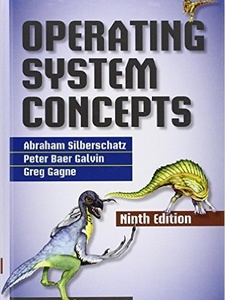Students also studied
Textbook solutions
Flashcard sets
Study guides
Practice tests

Operating System Concepts
9th Edition•ISBN: 9781118063330 (2 more)Abraham Silberschatz, Greg Gagne, Peter B. Galvin
652 solutions

Terms in this set (45)
(T/F) In a uniprogramming system main memory is divided into two parts.
True
(T/F) The use of unequal size partitions provides a degree of flexibility to fixed partitioning.
True
(T/F) In a multiprogramming system the available main memory is not generally shared among a number of processes.
False
(T/F) Programs in other processes should not be able to reference memory locations in a process for reading or writing purposes without permission.
True
(T/F) The memory protection requirement must be satisfied by the operating system rather than the processor.
False
(T/F) Any protection mechanism must have the flexibility to allow several processes to access the same portion of main memory.
True
(T/F) Secondary memory provides fast access at relatively high cost.
False
(T/F) A hardware mechanism is needed for translating relative addresses to physical main memory addresses at the time of execution of the instruction that contains the reference.
True
(T/F) In a multiprogramming environment the programmer knows at the time of coding how much space will be available and where that space will be.
False
(T/F) Overlay programming wastes programmer time.
True
(T/F) The principal operation of memory management is to bring processes into main memory for execution by the processor.
True
(T/F) A physical address is the location of a word relative to the beginning of the program and the processor translates that into a logical address.
False
(T/F) The best-fit algorithm is usually the worst performer.
True
(T/F) All segments of all programs must be of the same length.
False
(T/F) Segmentation does not eliminate internal fragmentation.
False
